After many unsuccessful attempts to get a meeting with Pakistan’s finance minister, we decided to simply show up at his office. Getting through security was surprisingly easy, but as we were about to waltz into the minister’s office, a large man summoned us.
The large man was the “Additional Finance Secretary”. We explained that we have been active foreign investors in Pakistan for six years, and had sent five unanswered emails to the minister over the past four weeks requesting a meeting. The man assured us that every email gets printed and placed on his desk so he personally saw every message we sent (though he did not recall seeing any of them). Instead of minister@finance.gov.pk, he said we should send our request to the Yahoo! email address on his official business card (?!) and he would get back to us in a few weeks. As it was apparent he was just trying to get rid of us, we persisted. He finally told us that if we follow him he would take us to shake the minister’s hand and make the appointment.
However, as we were passing by the minister’s door we realized that the man had no intention to stop. Instead, he said he was escorting us out of the building. In a last-ditch effort, we knocked on the door and were about to open it – only to be dragged away by the large man. We later learned that finance minister takes 2-hour afternoon naps in his office, so we hope we didn’t wake him up.
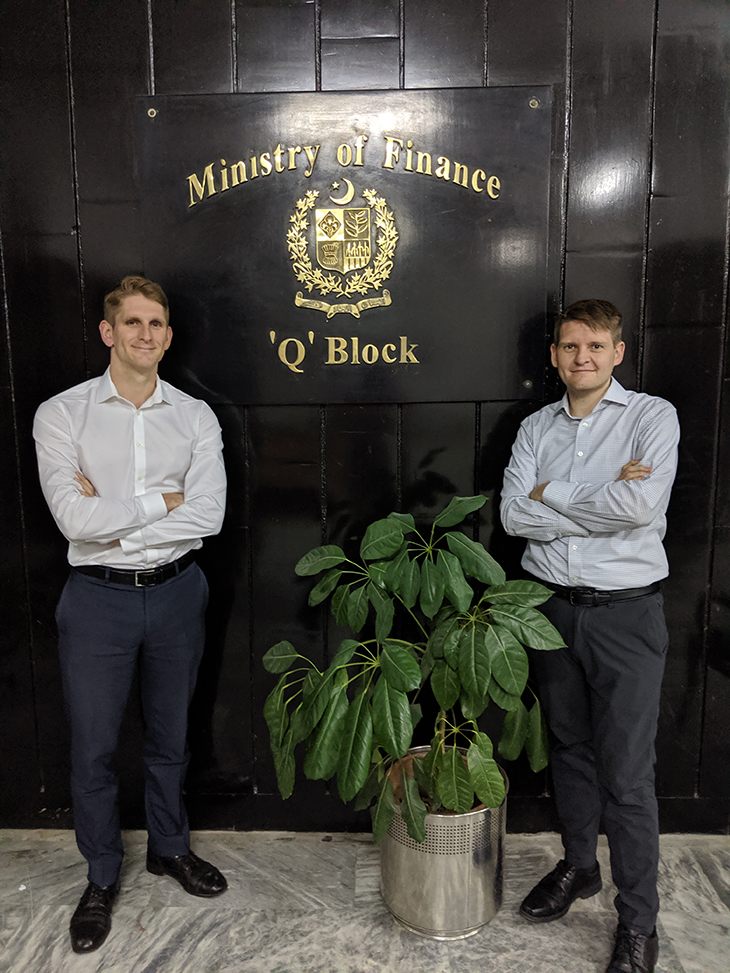 Ivan Nechunaev and Burton Flynn visiting the ministry of finance during a month-long stay in Pakistan
Ivan Nechunaev and Burton Flynn visiting the ministry of finance during a month-long stay in Pakistan
Weak currency and strong culture: an exporter's perfect combo
With the 35% rupee devaluation over the past 18 months driven by a growing current account deficit, getting a handle on the macro situation was essential for us to get comfortable rebuilding our once sizable position in Pakistan. To solve the balance of payments problem, Pakistan must either increase foreign capital inflows or decrease net imports – and given the low priority the finance ministry apparently assigns to foreign investors, we turned our attention to the trade deficit problem.
On the ground, we found most companies in a depressed state due to currency devaluation and struggling domestic economy. However, the exporters are poised to benefit from the devalued rupee, while import substitute businesses take advantage of government policies such as tax subsidies designed to reduce the problematic current account deficit. As a result, we invested in four companies which we believe will do well even in this turbulent time for the economy: three export-related businesses (an IT company, a textile manufacturer, and a hydrogen peroxide producer that supplies textile industry) and a fertilizer business benefiting from import substitution policies.
The IT services company we invested in is a hidden gem that shines from all angles. First, the business stands to benefit from the weak currency: while they hire the best IT talent locally, 80% of their revenue comes from overseas thanks to strong client relationships in North America, Germany and the Middle East. Second, they have grown earnings for many quarters and expect further 15% bottom-line expansion next year. And third, they have built an open-minded, friendly culture: we were impressed that the company’s CFO is female (having women in top positions is rare in Pakistan), there is a gym at the office (with female-only hours), and the employees collaborate, look happy, and smile. This progressive and growing business was trading at only 7x P/E, a bargain compared to its historical levels of around 20x and IT outsourcers in other markets trading at over 30x.
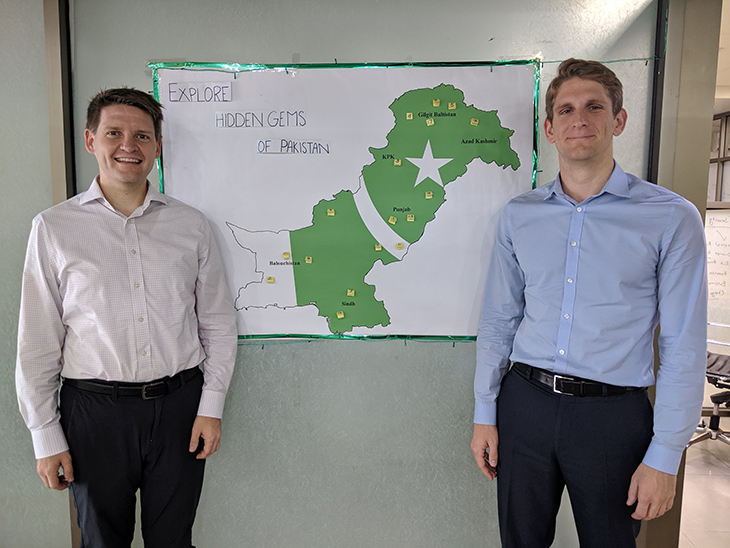 We spent a month looking for hidden gems in Pakistan
We spent a month looking for hidden gems in Pakistan
Camping out in Islamabad
Given the severe crisis Pakistan has undergone over the past two years, we decided to spend an entire month not only looking for hidden gems, but also studying the current political climate and macroeconomic situation. In fact, we purposely chose Islamabad (the political capital) as our base while also taking extended trips to Lahore and Karachi where most of the 45 listed companies we met are headquartered.
Fully immersing ourselves in this hopeful yet volatile market, we met with the central bank’s head of research as well as one of its former governors, the IMF resident representative overseeing the bailout package, senior economists at the World Bank, head of the stock exchange, SEC commissioner, chairman of the Board of Investment, as well as multiple federal ministers, ambassadors, parliament members, fund managers, and educational institutions. In addition, we visited several factories as part of investment due diligence, took a trip to see one of the China-Pakistan Economic Corridor (CPEC) zones, went to a CFA Society event, and toured the national parliament building.
As a result, we learned that the recent crisis stemmed from the central bank’s lack of independence from the government. At the direction of the previous administration, the central bank supported the currency until it ran out of reserves and had to accept massive devaluation, ultimately forcing an already import-driven economy to grow a massive current account deficit, which led to inflation and large foreign investment outflows. This crisis also exacerbated the so-called circular debt issue whereby the government delays payments to energy companies, causing those companies to delay their payments to their creditors and so forth.
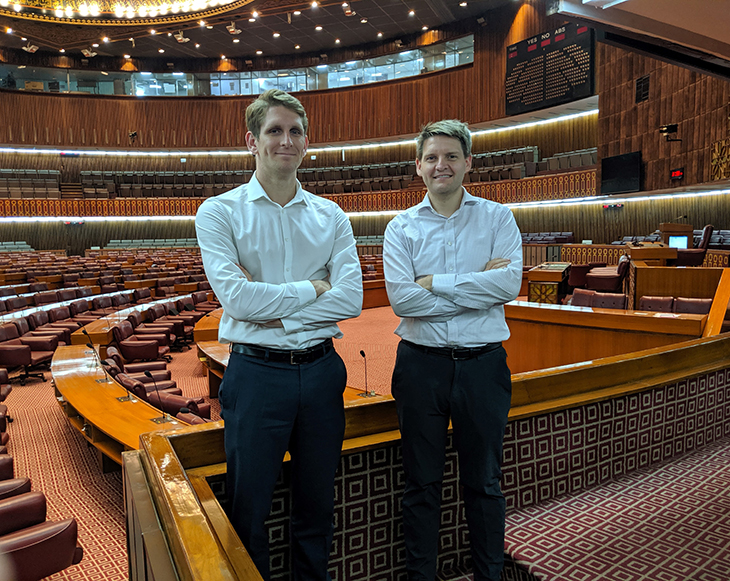 We met with multiple parliament members and federal ministers and toured the iconic parliament building
We met with multiple parliament members and federal ministers and toured the iconic parliament building
The not-so-invisible hand running the country
A theme that was recurring in many of our private conversations on the ground – especially with parliamentarians and ministers in Islamabad – was that the state is de-facto run by an “invisible hand”. That hand is actually quite visible – it is the Pakistan Army. Headquartered in Rawalpindi and informally called “the Pindi boys”, the Army which formally ran Pakistan for over half of its independent history is still involved not only in national security and foreign affairs, but also in most other aspects of government including the economy. It is also common knowledge that the Army ensured that the current administration would win the 2018 election, bringing to power the duo of a retired cricket champion prime minister and a dentist president.
It came as no surprise that during our visit the Army chief held a meeting with Pakistan’s business leaders who expressed their disappointment with the official government’s economic policies. The chief delivered a clear message that businesses should respect the prime minister’s actions and not support anti-government forces. This lack of political independence of the formal government as well as rumoured political disagreements inside the Army is concerning, especially given that the first peaceful transition of power in Pakistan’s history happened only six years ago. We agree with the legendary emerging markets investor Mark Mobius who said that despite Pakistan gaining the emerging markets status in 2017, he would continue to treat it as a frontier market.
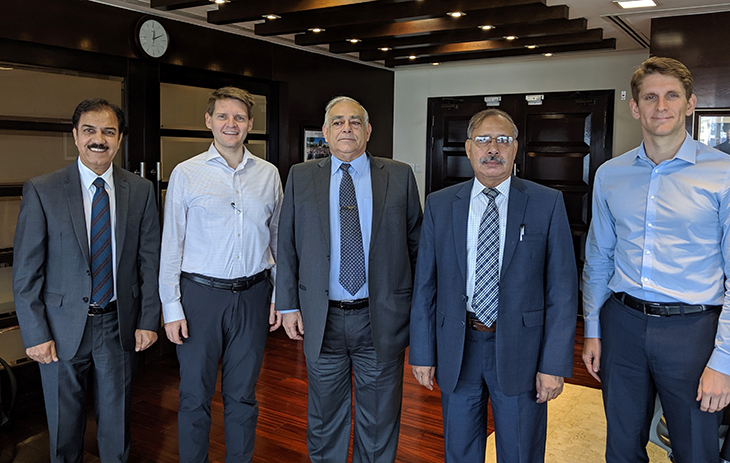 Meeting with an €700m fertilizer company in Rawalpindi whose CEO is a local war hero
Meeting with an €700m fertilizer company in Rawalpindi whose CEO is a local war hero
500 politicians behind bars
Nonetheless, the support of the Army gives the current government carte blanche to execute on highly needed reforms. One of the prime minister’s top priorities is to fight corruption. In fact, during our first week in the country, he was quoted as saying he wants to put 500 corrupt politicians in prison. Of course, many of his political opponents we spoke to view this as nothing more than political persecution against the opposing party; however, his direct approach, apparent lack of interest in personal monetary gains, and Kashmir populism help him win the support of the people.
If carried out effectively, the prime minister’s push for economic reforms, business documentation, and taxation can help curb the country’s budget deficit. Meanwhile, FDI through the €56b China-Pakistan Economic Corridor investments will help increase the economy’s productivity and stimulate growth. In addition, the government appears to be committed to avoid being placed on the blacklist of the Financial Action Task Force which evaluates countries which are non-cooperative in the global fight against money laundering and terrorism financing. Our local expert sources viewed a downgrade from its current greylist status as highly unlikely.
So far, the reforms have been running on track. At the end of our month-long trip, we attended an event announcing Pakistan’s unprecedented move up by 28 spots in the World Bank's Ease of Doing Business ranking from 136 to 108 (out of 190 countries). During our month-long stay in the county, we personally witnessed some of the achievements, as well as some of the need to continue progressing. For example, the massive power shortages we had heard about are mostly a thing of the past due to dramatic improvements in access to electricity (this ranking increased from 167 to 123). The introduction of the e-visa this year is another great advancement (though it still took a WhatsApp message from a fellow Wharton alum who is a member of parliament to get it finally approved after the 10-day waiting period had passed).
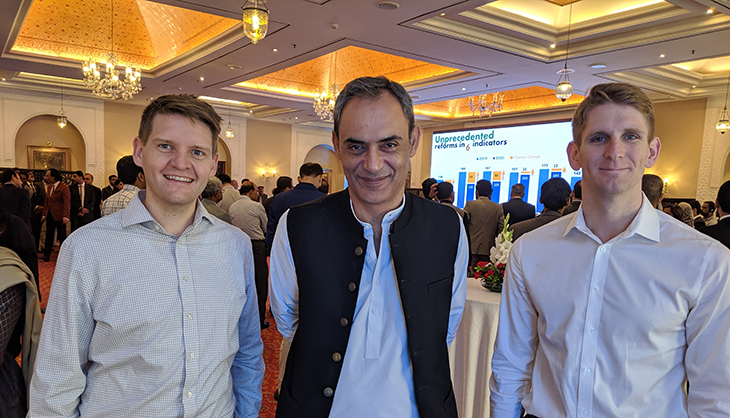 With the Minister of State and Board of Investment chairman who invited us to attend an event announcing the World Bank’s Ease of Doing Business ranking improvement
With the Minister of State and Board of Investment chairman who invited us to attend an event announcing the World Bank’s Ease of Doing Business ranking improvement
Protected by the “Pindi boys”
A curious situation happened on one of the nights in Karachi when a fellow Wharton alumnus was picking us up for dinner from our hotel. For some reason, the parking lot was full of military trucks and bodyguards armed with AK-47’s. As we climbed in the alum’s truck, we said: “Looks like some very important ‘big shot’ is at the hotel tonight”, to which he responded: “Don’t worry, these are my boys”. It certainly helped us worry less when we learned that his “boys” are retired Army officers (aka “Pindi boys”) and his truck is bulletproof.
While this anecdote may sound not only entertaining but also alarming, we were relieved when the alum said that most of his business partners stopped using armed support a couple of years ago and he only continues the practice out of habit. The security situation in Pakistan has in fact improved a lot in recent years, though security checks are still strict and common: several times we were stopped on the streets by the Pindi boys exercising racial profiling.
On one of the nights when we were in Lahore, after a tough schedule of 7 company meetings, in order to catch the CFO of another company we attended a cricket match that Pakistan played against Sri Lanka – the first major international match on Pakistan’s soil in a decade (the last game against Sri Lanka 10 years ago was interrupted by a terrorist attack). Security at the stadium was taken very seriously. When interviewed by six local TV channels, we expressed our view that Pakistan’s security issues are largely exaggerated and shared that we came with our families for an entire month. Indeed, we were very much pleased that the Pakistani people made us feel safe and welcome during our stay.
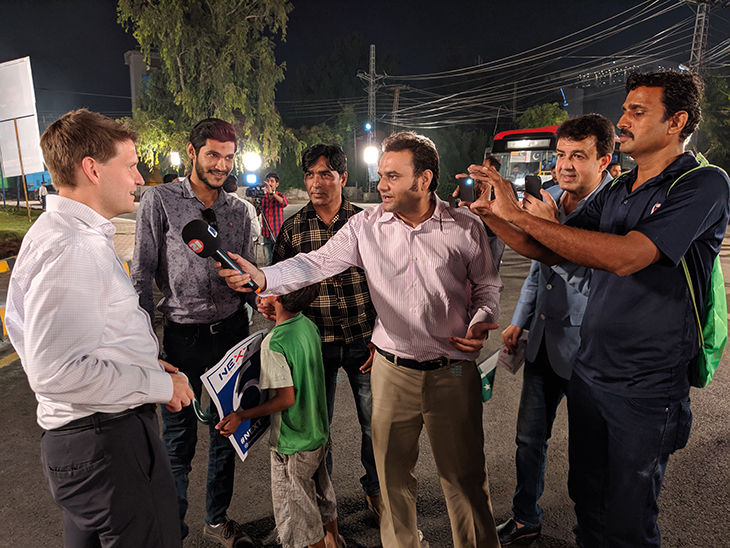 Being interviewed by a local news station about foreigner security sentiment
Being interviewed by a local news station about foreigner security sentiment
Meeting with the climate change minister
As responsible investors, we cannot close our eyes on long-term sustainability issues that threaten the planet and humanity. In Islamabad, far away from the large international forums we met with the federal minister for climate change to learn about Pakistan’s actions to mitigate climate change impact. Hearing that the temperatures in Pakistan are rising faster than the global average was alarming. Emitting less than 1% of worldwide greenhouse gases, the country of almost 220 million people is among the biggest sufferers of climate change: it has experienced deadly heat waves, excessive monsoon rainfall, and several hottest days on record in recent years. Knowing that the government is taking measures such as planting 10 billion trees (of which 1 billion has been planted), banning single-use plastic bags, and working on an electric vehicle policy showed us that the threat is taken seriously at the highest level.
In a meeting with the central bank’s head of research, we learned that he had already built an econometric model that includes climate change among the risks to Pakistan’s economic growth. While this model has not yet made its way into official growth projections, we appreciated that the central bank is getting concerned about long-term economic sustainability that can be impacted by climate-related shocks. When it comes to climate change awareness, Pakistan is more advanced than many developed countries.
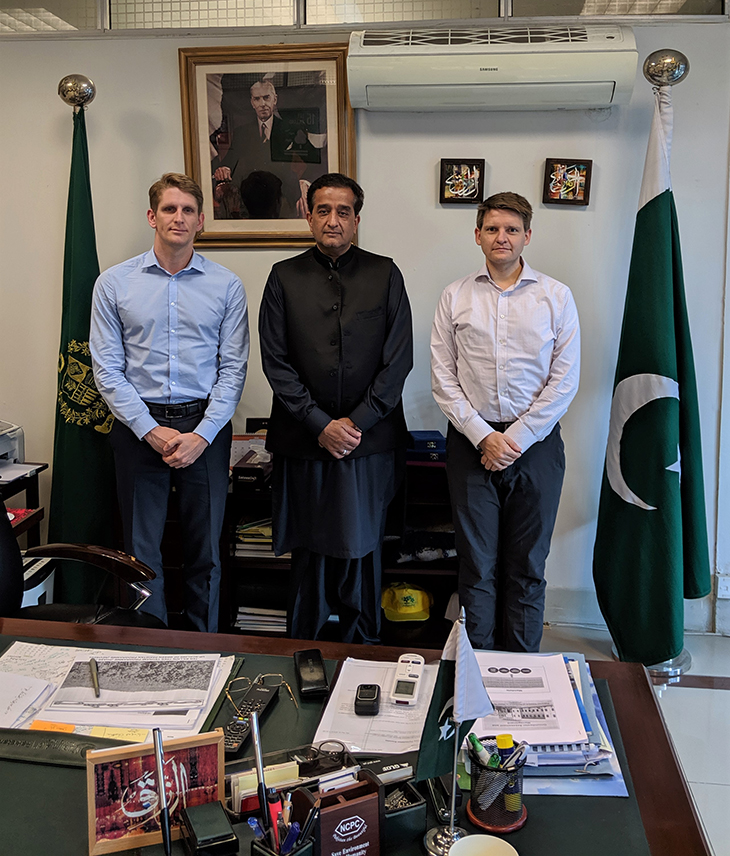 Meeting with Pakistan's federal minister for climate change
Meeting with Pakistan's federal minister for climate change
What is ESG?
In all our meetings with the companies across the globe, we ask each CEO or management team about their ESG policy. While most companies in emerging markets know what ESG stands for, only 5 firms in Pakistan were aware of the term. A few more were able to articulate sound ESG practices despite not knowing the acronym. One company's CFO abruptly stood up and left halfway through our meeting when we asked about their ESG policy.
Our guess is that because foreign institutional investors left Pakistan in the last couple of years when ESG has become ubiquitous, the market has not had much exposure to responsible investors actively asking explicit ESG questions in person. While the widespread lack of ESG knowledge among the local companies was surprising, we also appreciated the opportunity to be missionaries spreading the gospel of ESG.
One steel company impressed us with their ESG approach. Not only had they signed the UN Global Compact back in 2006 (and are one of only a dozen public companies which have signed so far), they also publish voluntary (and well-detailed) annual sustainability reports, align their operations with the UN SDGs, adhere to the principles of circular economy, and measure economic, environmental, and social impact. An independent director on their board served for a decade as the head of Pakistan Institute of Corporate Governance and now leads the Centre of Excellence in Responsible Business (CERB) at the Pakistan Business Council, an organization promoting sustainable value creation. We gladly visited CERB to learn more about their work on educating Pakistani companies about the long-term benefits of advanced sustainability practices, and appreciated hearing about their recent expansive ESG survey of local listed companies.
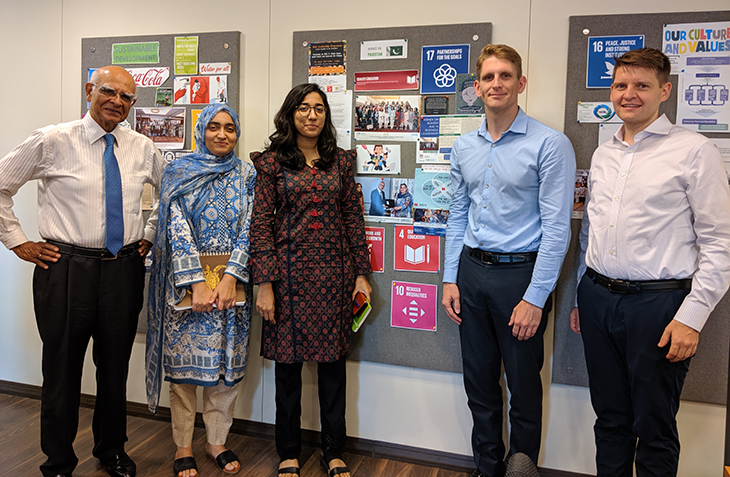 Meeting with the local organization promoting sustainable business
Meeting with the local organization promoting sustainable business
ESG is a threat to the Pakistan Stock Exchange
We met with the head of Pakistan Stock Exchange for over two hours to discuss the state of local capital markets. An interesting fact we learned was that only 0.1% of Pakistan’s population is invested in equities. A good hour was spent discussing the state of ESG on the stock exchange and then explaining how strong ESG practices among market participants can help attract institutional investors to Pakistan. We were asked sarcastically: "Do you guys really believe in wind energy?"
We were disappointed to hear that in bourse’s view any mandatory sustainability reporting requirements may reduce the exchange’s fees because some companies would rather delist than provide detailed ESG information or improve their sustainability practices. It will likely take many years before sustainability reporting in Pakistan becomes mandatory as it has lately been happening across other emerging markets. We subsequently raised our concerns in a meeting with the SEC commissioner who was personally interested in our request for greater reporting transparency of sustainability practices. While the Commission is currently more focused on issues such as market information leakage and financial crimes, he committed to give this matter more attention as a result of our meeting.
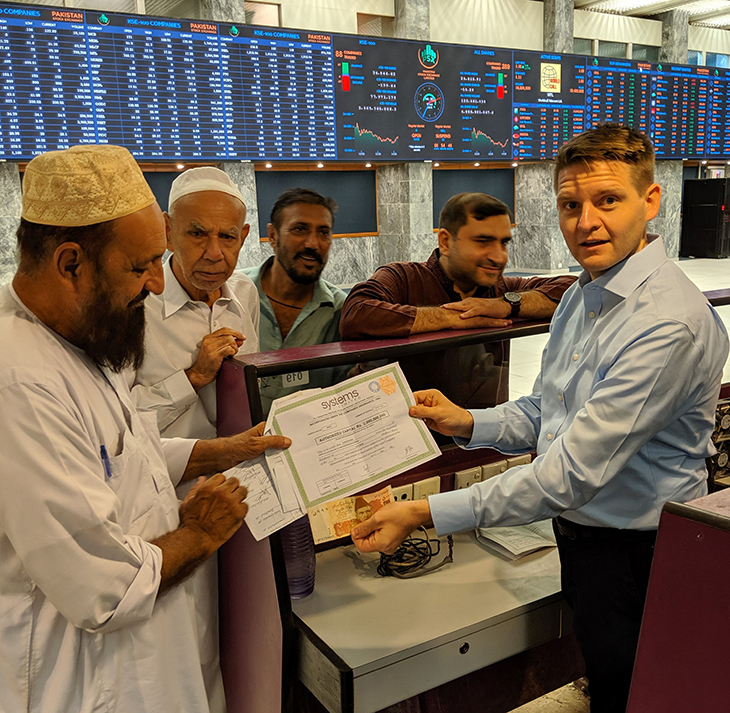 Buying stocks at the Pakistan Stock Exchange
Buying stocks at the Pakistan Stock Exchange
The dysfunctional state of education
During our month in the country, we met with the chairman of the higher education commission, visited the education governing body in the province of Punjab that oversees dozens of millions of students, and were impressed by the immense work done by the largest education-focused foundation which manages to deliver higher quality education than public schools at less than half the government’s cost through its 1,500 schools.
However, we are extremely worried about the overall state of education in Pakistan. Of 51 million school-age children, almost half do not have access to this essential human right due to severe lack of educational infrastructure. The stunted human capital development poses a threat to Pakistan’s long-term growth potential and its ability to compete against other countries.
 Meeting with the Citizens Foundation which has built over 1,500 schools in Pakistan
Meeting with the Citizens Foundation which has built over 1,500 schools in Pakistan
Giving back to Pakistan's future
We like to give back to the markets in which we invest. This is why when a finance professor at the Institute of Business Administration (IBA) in Karachi, Pakistan asked us to speak to his students, we agreed eagerly. Despite a full day of company meetings and a flight to Islamabad right after, we managed to squeeze in time on the way to the airport to greet 100 students waiting for us.
Among the great questions students asked us – from Pakistan's challenges to investment strategies and career advice – one especially stood out: why is there such a difference between developed markets such as Finland and emerging markets such as Pakistan? We shared that the difference often stems from the strength of countries' institutions, and suggested the students read "Why Nations Fail" which covers this matter well. We were also pleased that several students knew what ESG is, and we explained its importance to dozens more.
We were told that IBA is the oldest business school outside North America, set up in 1955 with support from the Wharton School. The traditions and quality seem to be preserved well: we were impressed by how engaged the students were, and how committed to their development the professor is. These bright young people might represent the best future Pakistan has ever had.
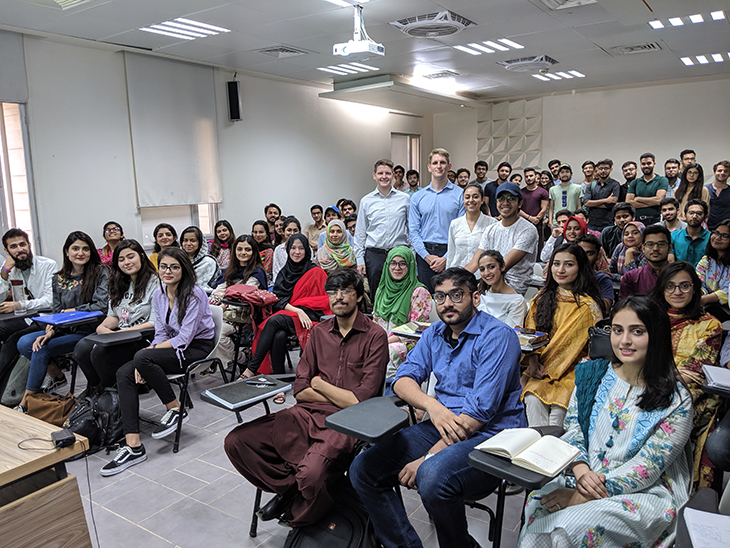 Giving a guest lecture at the Institute of Business Administration in Karachi
Giving a guest lecture at the Institute of Business Administration in Karachi
Our next stop
Having spent a month in each – the Philippines, Malaysia, Indonesia, Bangladesh, and Pakistan – we are departing to the sixth country in our effort to live in 12 emerging markets in 12 months. Stay tuned for... Thailand.
Learn more about our Evli Emerging Frontier Fund
Our recent blogs
A month in Bangladesh: We're investing billions in the world’s best stock market
A month in Indonesia: Offending Trump in Bali
A month in Malaysia: Finding another gem on "Treasure Island"
A month in the Philippines: How active management helped us beat the traffic (and the market)















